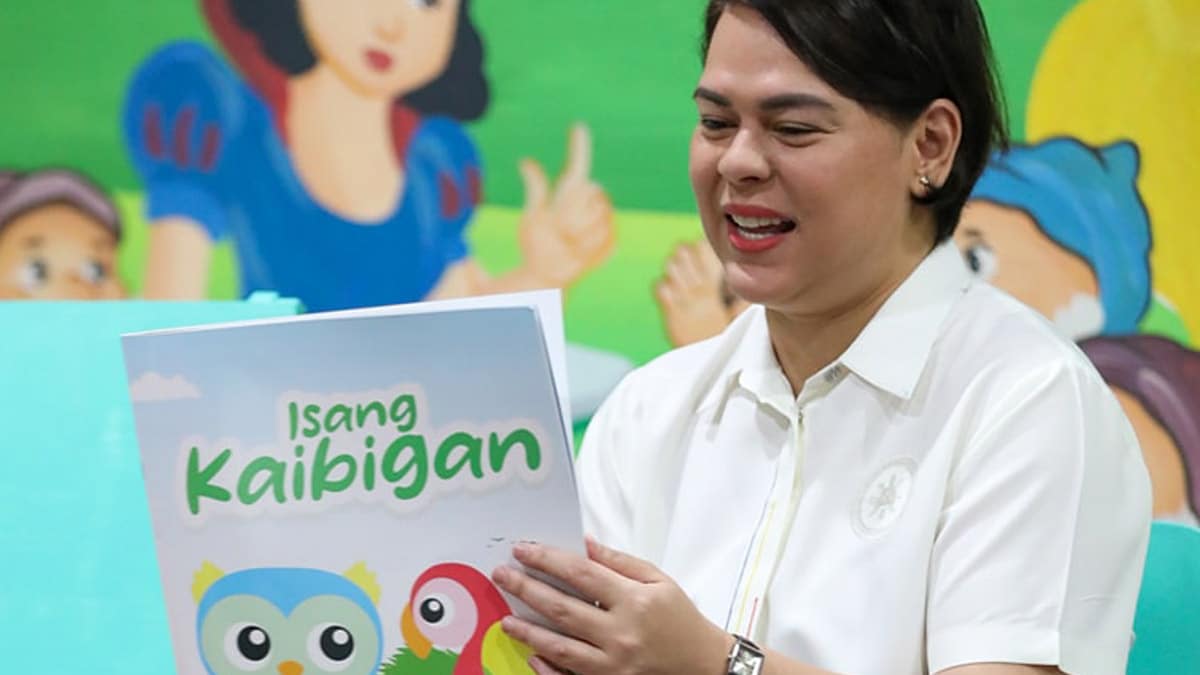OVP programs: Rules unclear, results unsure – COA

NO SIMPLE TALE One of the earliest to be called out among the projects of Vice President and then Education Secretary Sara Duterte was her self-authored children’s book titled “Isang Kaibigan (A Friend),” when it was revealed in August that a P10-million budget had been requested just to have it printed. —Photo from the Department of Education
MANILA, Philippines — The Commission on Audit (COA) has flagged two of Vice President Sara Duterte’s prominent programs for lacking clear procedures and having a low fund utilization rate.
One was Duterte’s “PagbaBAGo Campaign Program,” a project that her office had frequently promoted since last year, where she distributed bags of school supplies and dental kits on campuses.
The program also called for a million trees to be planted, hence the Office of the Vice President (OVP) also described it as the combination of “two elements essential for a sustainable and prosperous future: education and environmental stewardship.”
READ: COA cites jump in 2023 OVP travel costs
The PagbaBAGo bag typically contained a raincoat, school supplies like pens, pencils, sharpeners and notebooks, and a dental hygiene kit composed of a toothbrush and a tube of toothpaste.
The OVP then set a goal to give away bags to a million students nationwide by 2028, especially in “remote and economically challenged communities.”
It was also under this program that the OVP planned to publish the now-controversial children’s book “Isang Kaibigan (A Friend)” which named Duterte as its author.
The book project came under fire in August when it was revealed in a Senate hearing that Duterte had requested a budget of P10 million for its printing.
Incomplete guidelines
In their 2023 audit report published on the COA website on Monday, state auditors noted that Duterte’s bag distribution program had “incomplete guidelines and procedures.”
Specifically, the OVP failed to provide ample details about the beneficiary schools, the target grade levels, the distribution itself and the management of its inventory, the report said.
Last year, auditors said, the OVP distributed school bags and dental kits to 146,274 students, amounting to P40.5 million.
Based on its inquiry into the OVP special projects division (SPD) which was in charge of the program, the COA said there were “several factors” considered in the selection of the schools, such as their location, their classification as a “last-mile school,” and whether there were indigent beneficiaries of the Pantawid Pamilya Pilipino Program (4Ps) in their locality.
The program supposedly prioritized Grades 1 and 4 students, but “there were instances that [it catered] to all grade levels when there was enough inventory of bags and kits,” the COA added.
Distribution under ‘doubt’
The program’s distribution lists were also “not uniformly predetermined as to the names of the students,” and were thus “not consistent” with standard procedures.
This particular oversight “casts doubt” on whether the intended beneficiaries actually received their bags of school supplies and dental kits.
Also because of the “lack of detailed procedures” for the distribution, state auditors said, only nine out of the 57 sampled distribution points produced the required forms.
Only 4 of 578 applications
The COA report on the OVP also took note of the low budget usage of Duterte’s “Mag Negosyo Ta ‘Day” (MTD) program, which was intended to promote entrepreneurship in the grassroots.
According to the audit report, the program had an allotted budget of P150 million but only P600,000, or 0.4 percent, was used last year due to “unforeseen difficulties” in the implementation.
MTD’s objectives were therefore not fully achieved, it said, since only four organizations received financial assistance out of the 578 applications.
These were the Makabagong Ina at Kababaihan Tungo sa Asenso, Hugpong ng Kababaihan sa Montevista, Kusog Kababayen-An Dipolog City chapter and the Palauig LGBTQ Inc.
“Assessment and inquiry of the audit team showed that the budget set for the program was not carefully planned,” the commission said.
The implementing unit for the program was also undermanned, it added.